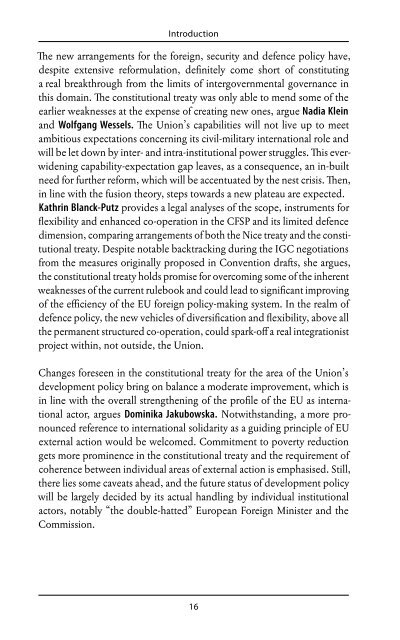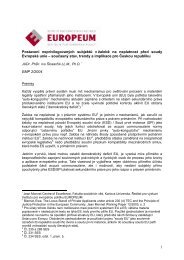eu constitutionalisation - EUROPEUM Institute for European Policy
eu constitutionalisation - EUROPEUM Institute for European Policy
eu constitutionalisation - EUROPEUM Institute for European Policy
Create successful ePaper yourself
Turn your PDF publications into a flip-book with our unique Google optimized e-Paper software.
IntroductionThe new arrangements <strong>for</strong> the <strong>for</strong>eign, security and defence policy have,despite extensive re<strong>for</strong>mulation, definitely come short of constitutinga real breakthrough from the limits of intergovernmental governance inthis domain. The constitutional treaty was only able to mend some of theearlier weaknesses at the expense of creating new ones, argue Nadia Kleinand Wolfgang Wessels. The Union’s capabilities will not live up to meetambitious expectations concerning its civil-military international role andwill be let down by inter- and intra-institutional power struggles. This everwideningcapability-expectation gap leaves, as a consequence, an in-builtneed <strong>for</strong> further re<strong>for</strong>m, which will be accentuated by the nest crisis. Then,in line with the fusion theory, steps towards a new plateau are expected.Kathrin Blanck-Putz provides a legal analyses of the scope, instruments <strong>for</strong>flexibility and enhanced co-operation in the CFSP and its limited defencedimension, comparing arrangements of both the Nice treaty and the constitutionaltreaty. Despite notable backtracking during the IGC negotiationsfrom the measures originally proposed in Convention drafts, she argues,the constitutional treaty holds promise <strong>for</strong> overcoming some of the inherentweaknesses of the current rulebook and could lead to significant improvingof the efficiency of the EU <strong>for</strong>eign policy-making system. In the realm ofdefence policy, the new vehicles of diversification and flexibility, above allthe permanent structured co-operation, could spark-off a real integrationistproject within, not outside, the Union.Changes <strong>for</strong>eseen in the constitutional treaty <strong>for</strong> the area of the Union’sdevelopment policy bring on balance a moderate improvement, which isin line with the overall strengthening of the profile of the EU as internationalactor, argues Dominika Jakubowska. Notwithstanding, a more pronouncedreference to international solidarity as a guiding principle of EUexternal action would be welcomed. Commitment to poverty reductiongets more prominence in the constitutional treaty and the requirement ofcoherence between individual areas of external action is emphasised. Still,there lies some caveats ahead, and the future status of development policywill be largely decided by its actual handling by individual institutionalactors, notably “the double-hatted” <strong>European</strong> Foreign Minister and theCommission.IntroductionPromise (un)fulfilledThe main tasks of the debate about the future of Europe were fulfilled.The proposed constitutional treaty would have contributed to the <strong>constitutionalisation</strong>process of the EU, the previous treaties would have beensimplified, decisive steps towards the simplification of laws and procedureswould have been taken. According to the constitutional treaty, the EUwould have become more transparent and democratic; stronger role wouldhave been given to directly elected bodies, the <strong>European</strong> Parliament andnational parliaments, and directly to citizens via their right of petition. Themethod of the Convention itself was a proof of increasing transparency ina complex process of <strong>European</strong> integration; more openness was requiredfrom all EU institutions as well. The inclusion of the Charter of HumanRights was making the EU more democratic. Proposed re<strong>for</strong>m of EU institutionscould have helped the Union to become more flexible and dynamicin solving problems and challenges of the new century.Still, the attempt to adopt the Treaty establishing the first <strong>European</strong>Constitution failed. The reasons were many: lack of communication withcitizens and increasing gap between political elites and voters, domesticproblems projected into the voting behaviour, different perceptions ofwhat the Constitution really was about, and the global challenges of thenew millennium such as immigration, social insecurity, terrorism and globalization.The process of <strong>constitutionalisation</strong> of Europe continues andthe EU is not in cul-de-sac; it is learning from its past failures and preparingitself <strong>for</strong> a new stage. All aspects of the constutionalisation process have tobe carefully studied and the lessons have to be learnt. This book aspires tocontribute to the discussion in the period of reflection.Prague, December 200516 17








